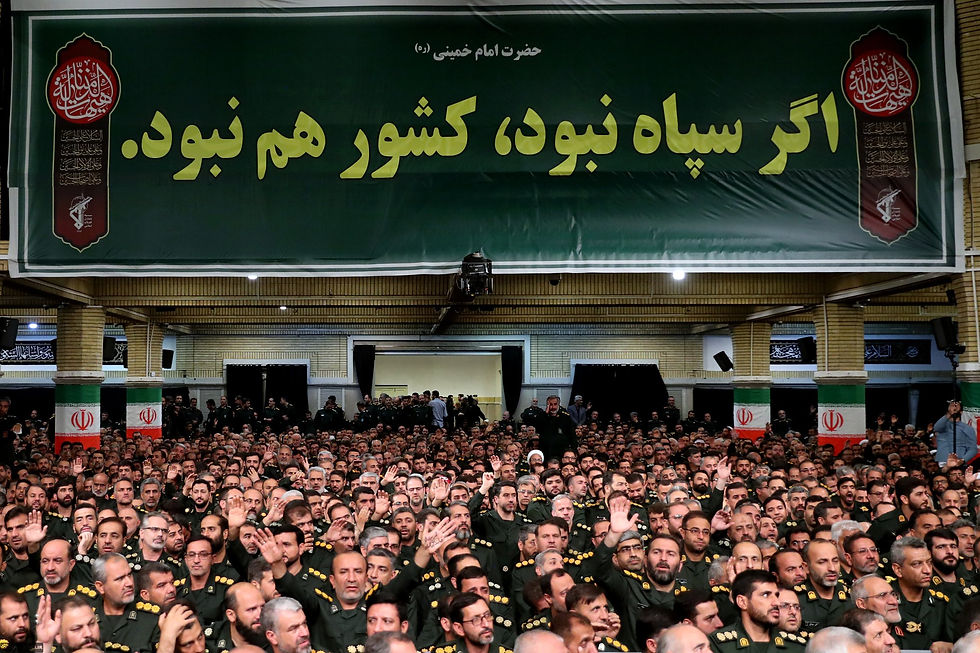Khamenei Hails IRGC, Vows to Expel America from Region
- Mickey Segall
- Aug 17, 2023
- 3 min read

In a Supreme Council of IRGC Commanders gathering on August 17, Iran's Supreme Leader Ali Khamenei spoke highly of the Islamic Revolutionary Guard Corps (IRGC) as an "exceptional and unique phenomenon." Khamenei shared a poignant image of the late Quds Force Commander Qasem Soleimani and made robust statements about the IRGC's role and capabilities in protecting the revolution and assisting "resistance movements in the region while promising to avenge martyrs blood and continue challenging Western influence in the region and expel America from the region.
The Covid-19 pandemic disrupted Khamenei's yearly address, with the last assembly taking place in October 2019, three months before the IRGC Quds Force Commander, Qasem Soleimani, was killed in a U.S. drone strike in Iraq in January 2020. On August 17, Khamenei's website posted a 2019 gathering video showing Soleimani wiping away a tear. A photo of him on a prayer rug was positioned with the IRGC Commanders in the row. Recalling the commanders' last meeting with the martyr General Hajj Qassem Soleimani, Khamenei vowed that the IRGC would avenge the blood of its martyrs and expel America from the region.
Ayatollah Khamenei praised the IRGC, calling it "unique among the great revolutions of history" and stating that "in the history of the country, there has never been a military group with such spiritual, political, moral, and human health."
The leader said the IRGC has become a "major and comprehensively equipped global hub for counter-terrorism, executing operations that many of the world's prominent militaries cannot undertake.". He added that the IRGC defeated Western plots against Iran in the revolution's early days, preventing Iran from deviating from the right path. Khamenei stated, "The enemies were trying to undermine the revolution by creating continuous crises and then finish the work of the revolution, but the IRGC did not allow Iran to deviate from the right path, and this is why the enemies have so much hatred for the IRGC… The IRGC's performances in various dimensions have worried and forced the enemy to destroy the IRGC with lies, rumors, and nonsense." A prominent wall poster behind the leader echoed this sentiment, stating: "Without the IRGC, there would be no country."

Ayatollah Khamenei highlighted another primary reason for the antagonism towards the Islamic system: the Islamic Republic's position as an exemplar and leading force behind resistance movements in the strategically important West Asia region. He attributed the reduction and non-repetition of the phrase "military option is on the table" to the IRGC's deterrence power and capabilities, remarking, "Everyone knows that this phrase has become trivial, meaningless, and worthless."
Khamenei compared the grounding of the armed forces of three Arab countries against the Zionist regime in the years before the revolution, specifically the six-day war of 1967 and the war of 1973, with the regime's failure to defeat Hezbollah in the 33-day war (Second Lebanon War…Today, the situation has progressed to where young individuals are mobilizing and launching attacks (from Gaza) on the occupied Palestinian territories (Israel), including the region West of the Jordan River (West Bank). These actions have hindered the Zionist regime."
In his speech's final part, Khamenei called the West's strategic policy of creating crises in Iran a continuous policy, pointing to the CIA, Mossad, and British MI6 spy agencies as the main instigators of crisis in Iran. Khamenei emphasized the importance of national unity and "understanding the nation's duties against the enemy's designs."
The Commander-in-Chief of the Revolutionary Guards recalled the commanders' last meeting with the martyr General Hajj Qassem Soleimani and vowed that the IRGC would avenge the blood of its martyrs and expel America from the region.
Comentários